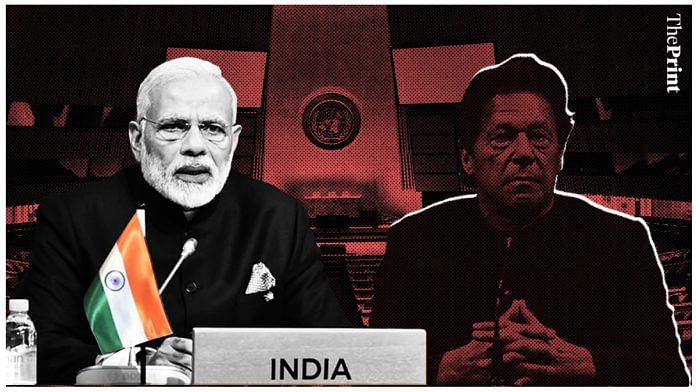Prime Ministers Narendra Modi and Imran Khan will address the 74th UN General Assembly session Friday amid heightened tension over Kashmir. This comes a day after Pakistan Foreign Minister Shah Mahmood Qureshi boycotted his Indian counterpart S. Jaishankar’s speech at the SAARC meeting in New York. Raising the Kashmir issue, Imran Khan urged the international community to help avoid a nuclear war, as Modi made it clear that there is no room for mediation.
ThePrint asks: Does India-Pakistan sparring at UNGA bring any diplomatic benefit for either country?
Pakistan thinks smearing India on global stage diplomatic win, but New Delhi enjoys greater credibility
 Kanwal Sibal
Kanwal Sibal
Executive council member, VIF, and former foreign secretary
India has no interest in sparring with Pakistan at the UNGA, but it is obliged to react to Pakistan’s annual onslaught against it at such global forums. Lacking credibility on the international stage with a terrorism-tainted image, Pakistan seeks to attract global attention to itself by assaulting India diplomatically. It believes that smearing India on the international stage is a diplomatic victory.
When Pakistan speaks at such forums, the attendance is sparse and the address is essentially meant for home audience.
By seeing their leader on the UN podium, the public back home has the illusion that the world is listening with attention. The UNGA speech is given great play in the Pakistani media and so a false sense of diplomatic achievement is created.
India has much greater international credibility because of its demographic and growing economic size, and the leadership position it has taken on issues at the forefront of global attention, such as climate change. Modi has carved out a strong international image for himself and the country, and in the background of China’s intimidating rise, India is seen as a balancing factor.
The public relations aspect in UNGA speeches exists for all countries, but in India’s case, our message has much more meaning for the international system than Pakistan’s.
Sparring to some extent appears inevitable, given Pakistan’s stance on Kashmir
 Arun Singh
Arun Singh
Former Indian Ambassador to US
Imran Khan-generated India-Pakistan face-off at the UNGA is less about him making any diplomatic difference, and more about playing to the domestic audience.
Pakistan feels it has a political compulsion to be seen as internationalising the Kashmir issue. As a result, it invariably raises the issue in the run-up to the UN General Assembly session. This year, it has done so in a more vitriolic and intensified manner because of the action India has taken on Article 370.
It is also clear that Pakistan’s establishment does not have much reason to be satisfied with the results of its efforts, with Imran Khan himself saying that he was disappointed with the international community’s response. Khan, however, added that he would continue to raise the issue. Turkish President Recep Tayyip Erdogan’s was the only voice somewhat supporting Pakistan’s stance on Kashmir.
India’s strategy normally has been to not respond to Pakistan in the same vein so as to avoid being equated with the neighbour and project itself as a country with broader and diverse interests.
Yet, India needs to formally state its position on Kashmir for the record. Sparring, therefore, to some extent appears inevitable, given Pakistan’s stance on the issue.
But this won’t yield any result, beyond causing amusement and irritation to the delegations at the UNGA. Nevertheless, most countries would still advocate lowering of tensions between India and Pakistan if they think a crisis is at hand.
India has taken a very drastic step in total violation of its commitment to Kashmiris
 Abdul Basit
Abdul Basit
Former Pakistan High Commissioner to India
Pakistan and India have been sparring at different multilateral forums over Kashmir, including the UN General Assembly, with hardly any significant impact for either side.
However, the situation this time is qualitatively different. By scrapping the special status of Jammu and Kashmir on 5 August and by keeping over 8 million (80 lakh) Kashmiris under siege for almost two months now, India has defied not only its constitution but also international law and UN resolutions.
There has been an unprecedented reaction by the international community, especially civil societies around the world, on the Kashmir issue. Pakistan Prime Minister Imran Khan would put things in the right perspective by taking up this issue at the UNGA. The world may still not pay much heed, but it is incumbent upon Pakistan to keep raising its voice against the Indian state’s ‘terrorism’.
India has taken a very drastic step in total violation of its commitment to Kashmiris. Pakistan can never accept this. Imran Khan understands the public pressure on the issue. UNGA is a part of Pakistan’s long-term Kashmir diplomacy. While I obviously don’t see the Kashmir conflict being resolved soon, Imran Khan’s debut address at the UNGA would be significant in terms of defining the contours of Pakistan’s Kashmir diplomacy in the months ahead.
Also read: Kashmir on complete lockdown ahead of Modi and Imran UN speeches
India can gain more by ignoring Pakistan’s rhetoric & instead focusing on issues like climate change
 Sankalp Gurjar
Sankalp Gurjar
Policy Analyst, Takshashila Institute
India does not gain anything by sparring with Pakistan at the UNGA. In fact, for a major power like India engaging in a war of words with Pakistan actually diminishes its status, re-hyphenates it with Pakistan, and demonstrates a lack of diplomatic foresight. Pakistan is a lesser power and India might actually gain more by ignoring Pakistan’s rhetoric at the UNGA than by responding to it.
However, India’s tough posturing and appearing to send a ‘message’ to Pakistan at an international forum will have short-term gains domestically.
With assembly elections due in Maharashtra and Haryana, domestic imperatives and people’s perceived requirements of a ‘tough posture’ are likely to influence India’s position on Kashmir and Pakistan at the UNGA.
For Pakistan, provoking India to respond to its aggressive rhetoric is actually a victory. Pakistan would want to get the world to discuss India’s actions in Kashmir. Pakistan is also looking to score brownie points at the UNGA. India can negate Pakistani efforts by ignoring its rhetoric and instead focusing on other major issues such as climate change. So, it is not a good idea for India to fight with Pakistan at the UNGA.
Imran Khan’s diplomatic interactions have got some countries to break their deafening silence over Kashmir
 Zahid Hussain
Zahid Hussain
Columnist, Dawn
The world leaders gathered at the UNGA would be interested in listening to both Narendra Modi and Imran Khan. But, it’s not that they are unaware of the gross violation of human rights in Indian Kashmir and the dangers of the conflict turning into a wider conflagration. Yet, a powerful representation of the Kashmir issue by Pakistan Prime Minister Imran Khan could help draw the world’s attention towards the seriousness of the situation.
In the last one week, New York has become the scene of a diplomatic battle between Pakistan and India. The activities on the sidelines of the UNGA have already set the tone. It is the first time that Imran Khan will address the UNGA, but he seems to have already made significant impact through his meetings with other leaders.
Given the apathy of the international community regarding the plight of the 80 lakh Kashmiris still living under a lockdown, it has been a tough diplomatic challenge for Pakistan’s Prime Minister. Yet, Imran Khan’s relentless diplomatic interactions have got some countries to break their deafening silence over the Indian action in Kashmir.
Speaking at the UNGA after Narendra Modi would allow Imran Khan to respond to the Indian Prime Minister’s arguments.
Also read: Keep sipping globalisation Kool-Aid and you won’t get Trump’s globalist vs patriot UN line
By Taran Deol, journalist at ThePrint




India did not spar with Pakistan. India simply projected its achievements and emerging power to the world both at Houston and at UNGA.
Pakistan on the other side was on an all-out attack on India.
So this so-called “Indo-Pak sparing” was a one-way traffic.
If the international community is not affected by exaggerated threats of war mongering, it also doesn’t like excessive sermonising. What happens after the clampdown in the valley is lifted is of critical importance. The sooner we initiate democratic process and establish a duly elected government in J&K, better it would be for us to convince the international community. For them, Kashmir is a minor irritant and they don’t want to hear any bad news. If a terrorist incidence takes place in Kashmir after the clampdown is lifted, how are we going to respond? Imran Khan has deftly shirked the onus if such terrorist attack takes place and would immediately put the blame on India’s action. It is not that every time we can do a Balakot.
UN nothing more than a debating session. So there is nothing to be gained or lost. Power resides with Security Council.
One would be happier if people spoke of India and China in the same breath. Not India and Bangladesh / Vietnam. Certainly not India and Pakistan, although one feels no animus towards a neighbour with whom we have long standing issues that need to be addressed through a purposive bilateral dialogue. 2. If one may take a contrarian view on India – Pakistan jostling at the UNGA. Given the potential for conflict on the subcontinent, perhaps it is a good thing that both sides are carrying their grievances to the UN. It was designed to deal with precisely such fraught situations.